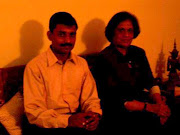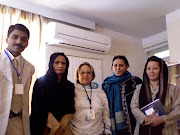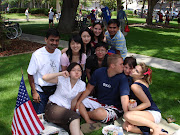This article was written by MK Bhadrakumar.
Former Pakistan prime minister Nawaz Sharif's decision to end his seven-year exile as a wandering minstrel of democracy and go home has set the cat among the pigeons. Sharif has chosen the path of 'strategic defiance' of Pakistan President Pervez Musharraf. It is now make-or-break time for Musharraf. His 'deal' with another former prime minister, Benazir Bhutto, threatens to unravel even before it becomes operational. Equally, the efficacy of the American blueprint for Pakistan's democratic transformation becomes doubtful.
What are Sharif's calculations? To be sure, neither the United States nor Britain could moderate Sharif's uncompromising stance against Musharraf. Sharif insists Musharraf must quit office. The mediatory missions by the Saudi Arabian and Lebanese ruling families have also proved futile.
Sharif is drawing strength from the realization that his sustained campaign against army rule has caught the imagination of the average Pakistani. A sure sign is that the perennial timeservers in Pakistani politics, the powerful Chaudhry clan ruling Punjab these past five years, have begun contacting Sharif in recent weeks seeking political accommodation. They have an uncanny knack for knowing which way the political wind is blowing. As many as 21 members of parliament belonging to the ruling party may have sent out 'feelers' to Sharif.
Musharraf and the Pakistan Muslim League that supports him have different takes on the 'deal' with Bhutto. Musharraf innately distrusts Bhutto. The army views her with distaste. She carries no clout with the Lahore establishment. She may well prove a burden that Musharraf can do without. But he has no choice in the matter as this 'deal' is what Washington wants.
The PML prefers the post-2002 alliance with the religious parties to continue. But Musharraf cannot countenance an open alliance with religious parties as that would mar his reformist image in Western capitals. Besides, Sharif is forging an alliance with some of the Islamic parties.
Musharraf sees Sharif as opportunistic, authoritarian, dangerously maneuvering, and incessantly plotting to extend his influence. There is no na�vet� about Musharraf. He knows he faces a crisis if there is a popular uprising. And Sharif is a skilful agitator, especially in the heartland province of Punjab, which accounts for 56 percent of Pakistan's population, and happens to be his political base.
Sharif introduces fluidity into the situation for Bhutto as well. She faces dissent within her Pakistan People's Party over the 'deal.' The dissidents regard the 'deal' to be a sell-out of PPP's ideology and principles. This raises question marks about the feasibility of the constitutional amendment that Musharraf seeks to ensure that his re-election as president is not reviewed in a court of law. An amendment requires two-thirds support of 229 votes in the 342-member parliament. The ruling coalition, its allies and Bhutto's PPP en bloc could mobilize 255 members of parliament.
But it is a close call, given the likelihood of defection to Sharif's camp by members of the ruling coalition. As many as 15 MPs belonging to the ruling party may abstain from voting. And these are early days. Sharif has carefully timed his return. He senses it is time to strike.
Sharif calculates that given the prevailing popular mood in Pakistan, he has a readymade anti-American, anti-Musharraf platform. He intends to call the general's bluff threatening to detain him. Once his juggernaut gets going from Punjab, it will become unstoppable. Sharif counts on the supreme court to ensure that a level playing field is available at the next general elections.
He doesn't think Musharraf any longer has the option of imposing emergency rule, as the courts will frustrate such a move. The only exit route for Musharraf will then be declaring martial law. But that is uncharted territory. No previous military dictator in Pakistan dared to take that route. Both Ayub Khan and Yahya Khan walked away rather than ask troops to crush popular opposition.
Sharif, therefore, expects Musharraf to cave in and call an all-party conference for discussing the modalities of constituting an interim caretaker government pending elections. Given the public opinion and an increasingly assertive judiciary, this outcome no longer seems implausible.
The irony is that there are several reasons why Sharif ought to have been Washington's man in Islamabad. Sharif can handle the menagerie of Islamists. His political pedigree dates back to the Zia-ul Haq era, and he knows best how to squeeze the jihadi culture out of Pakistan. Second, for the average Pakistani, Sharif is a 'desi neta'; he has gained in stature as a nationalist. That helps him leave behind the legacy of his misrule. Bhutto, on the other hand, is tarnished politically by her 'deal' with Musharraf as well as her proximity to the Americans.
She is yet to realise that her aura in Pakistan is turning out to be very different from her aura in America or Britain. Sharif is also genuinely pro-market and is friendly to large capital. He has taken care not to be branded as 'pro-American,' but he isn't reflexively opposed to American interests either. For him, modernization is something independent of 'Americanisation.' Indeed, despite his conservative rhetoric, Sharif has a proven record as a pragmatist.
Yet, if Washington has opted for Bhutto, the considerations were obvious. Sharif will refuse to be a participant in America's 'war on terror.' He understands America is the primary issue in Pakistan. He has sized up that the public expects him to be the marker of the beginning for Pakistan's 'post-American era,' no matter what his own gut instincts tell him. Least of all, Sharif's experience with Washington during his last term as prime minister was far from happy.
In other words, Sharif is good for globalisation, but can be a liability for the 'war on terror.' He may be good for Pakistan, but will be an unreliable ally for the present US administration with such weighty agenda toward Iran and Afghanistan. On balance, Washington decided to play safe. Bhutto, in comparison, will never create a faus pax for American interests. Besides, Sharif happens to be locked in a fierce blood feud with Musharraf. From Washington's perspective, Musharraf's continuance in power is non-negotiable. The bar of democracy shall be lowered to that end.
But no matter what Washington prescribed for Pakistan, the genie of democracy has leapt out of the bottle. Musharraf's re-election looks fanciful. There may be no other way of saving the regime except by imposing harsh emergency rule or even martial law.
This article was written by M K Bhadrakumar, a former Indian ambassador, headed the Pakistan Division at the Ministry of External Affairs in the early 1990s. http://in.rediff.com/news/2007/sep/10mkb.htm
Monday, September 10, 2007
Sunday, September 09, 2007
What kind of future awaits Bangladesh?
The interim government in Bangladesh has hit another landmark, arresting one of the country's most charismatic politicians, former Prime Minister Khaleda Zia. This arrest brings to an end weeks of speculation about the government's intentions. There were clear signs that the government was preparing to jail Ms Zia, with investigations into financial dealings during her last term in office.
But speculation was also rife that the government wanted to do a deal with her - particularly after she was allowed to clear outstanding income taxes dating back years, rather than face charges for tax evasion.
The Anti-Corruption Commission's decision to bite the bullet and file a specific charge triggered diverse reactions. This has been done to harass her politically, to prevent her from carrying out her political functions. It was no secret that the government was preparing to act against her. In fact, many were asking why Khaleda Zia had not been arrested yet.
The government is presenting the arrest as a clear demonstration that the drive against corruption is transparent and neutral. For her part, Ms Zia believes the charges and arrests are designed to "destroy" her family and remove them from Bangladesh's political scene. She was arrested along with her younger son Arafat. Her elder son Tarique is already in jail facing corruption charges. There is little doubt that the military-led government wants to see an end to the Zia family's domination of Bangladesh politics.
Ms Zia has led her Bangladesh Nationalist Party - or - BNP unchallenged for nearly 25 years. Tarique emerged as heir apparent after the party's stunning electoral triumph in 2001. Tarique's rapid rise to become the most powerful man in the country - with tales of rampant corruption associated with his band of cronies - alienated many inside the party. Other sections of society were also angered by what they saw as a brazen attempt to install and perpetuate a dynasty.
The government has not made any secret of its desire to force the two largest political parties, the BNP and its main rival the Awami League, to carry out extensive internal reforms. The central plank of this reform process is the so-called "minus-two solution" - the BNP without the Zia family, and the Awami League without its iconic leader Sheikh Hasina. The first, ill-conceived efforts to get rid of the two women failed miserably last May, when both Sheikh Hasina and Khaleda Zia successfully fought off clumsy attempts by the government to send them into exile. Now the government seems back on course, pursuing the same agenda.
Ms Hasina was put in jail in July and charged in a series of extortion and corruption cases. Now with Ms Zia in jail, the government's confidence level is likely to reach a new high. That confidence reached rock bottom towards the end of August, when students at Dhaka University were joined by thousands of others in three days of street demonstrations. The violent protests and clashes with police and army led the government to impose a curfew and arrest university teachers. There were allegations of widespread assaults on students and torture of people in custody.
The only thing which remains to be seen is how independently and fairly the special corruption courts are allowed to function. This has been one of the major factors in eroding public support for the government over the past few months.
The big question in Bangladesh now is - what kind of future does the government have in mind?
But speculation was also rife that the government wanted to do a deal with her - particularly after she was allowed to clear outstanding income taxes dating back years, rather than face charges for tax evasion.
The Anti-Corruption Commission's decision to bite the bullet and file a specific charge triggered diverse reactions. This has been done to harass her politically, to prevent her from carrying out her political functions. It was no secret that the government was preparing to act against her. In fact, many were asking why Khaleda Zia had not been arrested yet.
The government is presenting the arrest as a clear demonstration that the drive against corruption is transparent and neutral. For her part, Ms Zia believes the charges and arrests are designed to "destroy" her family and remove them from Bangladesh's political scene. She was arrested along with her younger son Arafat. Her elder son Tarique is already in jail facing corruption charges. There is little doubt that the military-led government wants to see an end to the Zia family's domination of Bangladesh politics.
Ms Zia has led her Bangladesh Nationalist Party - or - BNP unchallenged for nearly 25 years. Tarique emerged as heir apparent after the party's stunning electoral triumph in 2001. Tarique's rapid rise to become the most powerful man in the country - with tales of rampant corruption associated with his band of cronies - alienated many inside the party. Other sections of society were also angered by what they saw as a brazen attempt to install and perpetuate a dynasty.
The government has not made any secret of its desire to force the two largest political parties, the BNP and its main rival the Awami League, to carry out extensive internal reforms. The central plank of this reform process is the so-called "minus-two solution" - the BNP without the Zia family, and the Awami League without its iconic leader Sheikh Hasina. The first, ill-conceived efforts to get rid of the two women failed miserably last May, when both Sheikh Hasina and Khaleda Zia successfully fought off clumsy attempts by the government to send them into exile. Now the government seems back on course, pursuing the same agenda.
Ms Hasina was put in jail in July and charged in a series of extortion and corruption cases. Now with Ms Zia in jail, the government's confidence level is likely to reach a new high. That confidence reached rock bottom towards the end of August, when students at Dhaka University were joined by thousands of others in three days of street demonstrations. The violent protests and clashes with police and army led the government to impose a curfew and arrest university teachers. There were allegations of widespread assaults on students and torture of people in custody.
The only thing which remains to be seen is how independently and fairly the special corruption courts are allowed to function. This has been one of the major factors in eroding public support for the government over the past few months.
The big question in Bangladesh now is - what kind of future does the government have in mind?
Wednesday, September 05, 2007
Happy Teacher's Day
 (Teacher's Day in India is a tribute to the hard work that is put by the teacher all year long to educate a child. In India, teacher day is celebrated on 5th of September. Indian Teachers Day is dedicated to Dr. Sarvepalli Radhakrishnan, who was a staunch believer of education and was one of the greatest scholars and teachers of all times, apart from being the President of India. As a tribute to this great teacher, his birthday is observed as Teachers Day in India.)
(Teacher's Day in India is a tribute to the hard work that is put by the teacher all year long to educate a child. In India, teacher day is celebrated on 5th of September. Indian Teachers Day is dedicated to Dr. Sarvepalli Radhakrishnan, who was a staunch believer of education and was one of the greatest scholars and teachers of all times, apart from being the President of India. As a tribute to this great teacher, his birthday is observed as Teachers Day in India.)Teachers mold the lives that they influence. Lessons learned from teachers remain with their students throughout life. Teachers that break down barriers and reach into the souls of the students that they are responsible for do not get the recognition or gratitude they have earned. Many teachers are exhausted from their workload and responsibilities. Teachers need encouragement and support from the community to feel that their devotion to students is appreciated.
If you ever have come across one teacher in all your student life, which has changed your life and your way of thinking for the better, you have been blessed. Thankfully I have had several such opportunities. Right from pre-primary school right up to the University, I have benefited from teachers who have gone beyond their call of duty, to mould me and my fellow students into better human beings, first and foremost, and then to instill in us a sense of purpose for life, that at a young age seems all too ambiguous.
These teachers went above the regular lectures, exams; viva’s and juries, and made me realize that education is something much more than what is contained in the printed text book.
I consider education to be one of the nobler professions, akin to medicine. Teachers, who spend their lives teaching kids, do more than just teach. They help mould the future of our communities, cities and countries.
I shall forever be thankful to all those wonderful teachers, who have enriched my life. To name a few would not be fair, because there are too many to name. And this is a day about all the teachers who have worked silently, under great stress and pressure to produce responsible and capable citizens of this world.
Subscribe to:
Posts (Atom)











